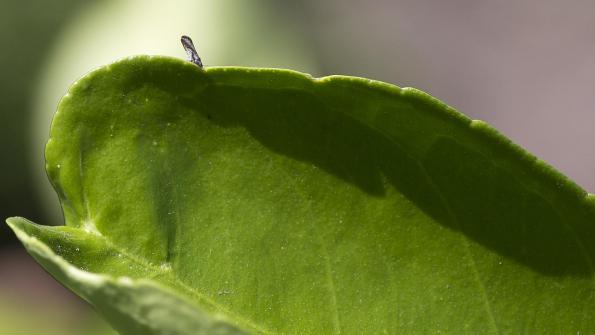
California’s leading producer of fresh oranges has been placed under a countywide quarantine for the Asian citrus psyllid (ACP) after two additional discoveries of the pest were made in September.
The news affects the entire citrus industry and comes on the heels of a psyllid discovery in a south Bakersfield neighborhood in neighboring Kern County.
With over half of the state’s total orange production coming out of Tulare County, and more than 1,000 acres each of grapefruit, pomelos, lemons and tangerines grown there, discovery of the Asian citrus psyllid has commanded much attention since it was first spotted in the county in 2012.
The declaration by the California Department of Food and Agriculture (CDFA) expands the county’s ACP quarantine from 765 square miles of land mostly along the western foothills of the southern Sierra Nevada in what some refer to as the “citrus belt.” Included in the county’s expanded quarantine are cities and unincorporated towns like Visalia, Tulare, Pixley, Tipton and Earlimart.
The announcement comes after a second adult ACP was trapped in a residential neighborhood in the City of Tulare. These are the first finds in the City of Tulare, and come within about a week of each other.
The two psyllid finds in Tulare were within about a mile of each other, according to Tom Tucker, assistant agricultural commissioner for Tulare County.
State hotline
Officials believe more psyllids remain undiscovered and are urging residents and growers to educate themselves on what to look for in their citrus trees. A state hotline has been established for those who think they may have discovered the ACP in their citrus trees. That number is 1-800-491-1899.
The pest is of major concern to citrus growers as it can carry a deadly tree disease called Huanglongbing (HLB), or citrus greening. The disease is only known to kill citrus trees. In the process, the disease renders fruit unmarketable and too bitter to consume. The disease is not known to present a human health threat.
Most of Tulare County’s ACP finds have been in non-commercial citrus trees within urban and suburban settings over the past year-and-a-half. Only recently were adult psyllids found on traps hung at packing houses in and near Tulare County, suggesting the possibility that pests are hitchhiking on citrus loads.
Tucker said making the entire county one quarantine zone will make it easier for citrus growers to ship fruit from Tulare County groves to Tulare County packing houses as no longer will growers within a quarantine zone have to treat fruit prior to being shipped to a processor down the road who is not in a quarantine zone.
Stringent regulatory rules are still applied to fruit shipped outside of Tulare County to regions that are not under an ACP quarantine.
California Citrus Mutual spokesperson Alyssa Houtby said the announcement was to be expected given the increased number of psyllids found in the county.
“This seems to be the right thing to do to control the psyllid,” Houtby said.
“The biggest issue for growers continues to be whether the state will continue with its 800-meter treatment protocols,” she continued.
Of concern to citrus growers will be the new U.S. Department of Agriculture protocols put into place as a result of the countywide quarantine. According to Houtby, the USDA lacks local treatment procedures that a CDFA program provides.
Under the eradication program employed by the CDFA, officials have been spraying citrus trees in the San Joaquin Valley within about a half-mile of confirmed psyllid finds. Those treatments happen only in non-commercial settings with homeowner permission.
“We don’t want to forego those treatments for fear the ACP will spread even faster,” she said.
Area-wide treatment
According to Houtby the regulatory announcement does not necessarily speed up the county’s psyllid management area (PMA) treatment proposal introduced a few months ago. The PMA plan is a voluntary effort of the citrus industry to convince growers to better coordinate spray procedures that are effective against the psyllid and other pests.
PMA zones have already been drawn up on a countywide map and volunteers sought to promote and coordinate area-wide treatment protocols should the industry move in that direction.
The goal is still to not reach that threshold, but if it is, that recommendation will come from University of California researchers like Elizabeth Grafton-Cardwell, who is an expert on citrus pests including the ACP.
Grafton-Cardwell is the director of the Lindcove Research and Extension Center (LREC) near the Tulare County town of Exeter. Though it was in an ACP quarantine zone prior to the countywide declaration, she said the University of California research facility continues to grow its own citrus seedlings and graft its own trees for research as one method of ensuring against disease.
“We also purchased fruit cleaning equipment that can be driven to an orchard,” Grafton-Cardwell said. “That way, if there is an off-center research project that needs to bring fruit to our pack line, we can disinfest it of leaves, twigs and potentially psyllids before it arrives at LREC. We are doing our best to prevent psyllids and HLB from reaching LREC and for now the research is continuing as before.
For more information on the Asian citrus psyllid and Huanglongbing visit www.cdfa.ca.gov/go/acp.
About the Author(s)
You May Also Like






